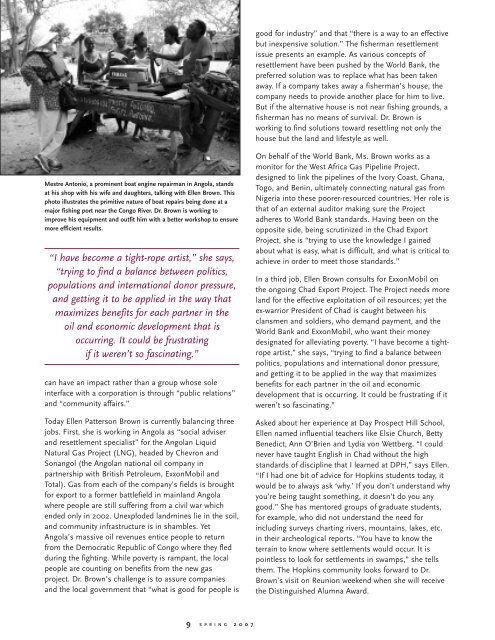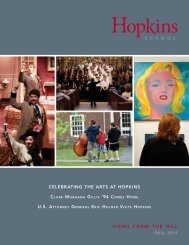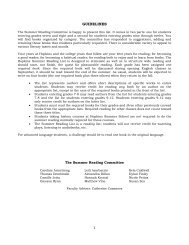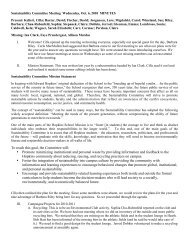For Love of the Game An Appreciation of Tom Parr ... - Hopkins School
For Love of the Game An Appreciation of Tom Parr ... - Hopkins School
For Love of the Game An Appreciation of Tom Parr ... - Hopkins School
Create successful ePaper yourself
Turn your PDF publications into a flip-book with our unique Google optimized e-Paper software.
Mestre <strong>An</strong>tonio, a prominent boat engine repairman in <strong>An</strong>gola, stands<br />
at his shop with his wife and daughters, talking with Ellen Brown. This<br />
photo illustrates <strong>the</strong> primitive nature <strong>of</strong> boat repairs being done at a<br />
major fishing port near <strong>the</strong> Congo River. Dr. Brown is working to<br />
improve his equipment and outfit him with a better workshop to ensure<br />
more efficient results.<br />
“I have become a tight-rope artist,” she says,<br />
“trying to find a balance between politics,<br />
populations and international donor pressure,<br />
and getting it to be applied in <strong>the</strong> way that<br />
maximizes benefits for each partner in <strong>the</strong><br />
oil and economic development that is<br />
occurring. It could be frustrating<br />
if it weren’t so fascinating.”<br />
can have an impact ra<strong>the</strong>r than a group whose sole<br />
interface with a corporation is through “public relations”<br />
and “community affairs.”<br />
Today Ellen Patterson Brown is currently balancing three<br />
jobs. First, she is working in <strong>An</strong>gola as “social adviser<br />
and resettlement specialist” for <strong>the</strong> <strong>An</strong>golan Liquid<br />
Natural Gas Project (LNG), headed by Chevron and<br />
Sonangol (<strong>the</strong> <strong>An</strong>golan national oil company in<br />
partnership with British Petroleum, ExxonMobil and<br />
Total). Gas from each <strong>of</strong> <strong>the</strong> company’s fields is brought<br />
for export to a former battlefield in mainland <strong>An</strong>gola<br />
where people are still suffering from a civil war which<br />
ended only in 2002. Unexploded landmines lie in <strong>the</strong> soil,<br />
and community infrastructure is in shambles. Yet<br />
<strong>An</strong>gola’s massive oil revenues entice people to return<br />
from <strong>the</strong> Democratic Republic <strong>of</strong> Congo where <strong>the</strong>y fled<br />
during <strong>the</strong> fighting. While poverty is rampant, <strong>the</strong> local<br />
people are counting on benefits from <strong>the</strong> new gas<br />
project. Dr. Brown’s challenge is to assure companies<br />
and <strong>the</strong> local government that “what is good for people is<br />
9 S P R I N G 2 0 0 7<br />
good for industry” and that “<strong>the</strong>re is a way to an effective<br />
but inexpensive solution.” The fisherman resettlement<br />
issue presents an example. As various concepts <strong>of</strong><br />
resettlement have been pushed by <strong>the</strong> World Bank, <strong>the</strong><br />
preferred solution was to replace what has been taken<br />
away. If a company takes away a fisherman’s house, <strong>the</strong><br />
company needs to provide ano<strong>the</strong>r place for him to live.<br />
But if <strong>the</strong> alternative house is not near fishing grounds, a<br />
fisherman has no means <strong>of</strong> survival. Dr. Brown is<br />
working to find solutions toward resettling not only <strong>the</strong><br />
house but <strong>the</strong> land and lifestyle as well.<br />
On behalf <strong>of</strong> <strong>the</strong> World Bank, Ms. Brown works as a<br />
monitor for <strong>the</strong> West Africa Gas Pipeline Project,<br />
designed to link <strong>the</strong> pipelines <strong>of</strong> <strong>the</strong> Ivory Coast, Ghana,<br />
Togo, and Benin, ultimately connecting natural gas from<br />
Nigeria into <strong>the</strong>se poorer-resourced countries. Her role is<br />
that <strong>of</strong> an external auditor making sure <strong>the</strong> Project<br />
adheres to World Bank standards. Having been on <strong>the</strong><br />
opposite side, being scrutinized in <strong>the</strong> Chad Export<br />
Project, she is “trying to use <strong>the</strong> knowledge I gained<br />
about what is easy, what is difficult, and what is critical to<br />
achieve in order to meet those standards.”<br />
In a third job, Ellen Brown consults for ExxonMobil on<br />
<strong>the</strong> ongoing Chad Export Project. The Project needs more<br />
land for <strong>the</strong> effective exploitation <strong>of</strong> oil resources; yet <strong>the</strong><br />
ex-warrior President <strong>of</strong> Chad is caught between his<br />
clansmen and soldiers, who demand payment, and <strong>the</strong><br />
World Bank and ExxonMobil, who want <strong>the</strong>ir money<br />
designated for alleviating poverty. “I have become a tightrope<br />
artist,” she says, “trying to find a balance between<br />
politics, populations and international donor pressure,<br />
and getting it to be applied in <strong>the</strong> way that maximizes<br />
benefits for each partner in <strong>the</strong> oil and economic<br />
development that is occurring. It could be frustrating if it<br />
weren’t so fascinating.”<br />
Asked about her experience at Day Prospect Hill <strong>School</strong>,<br />
Ellen named influential teachers like Elsie Church, Betty<br />
Benedict, <strong>An</strong>n O’Brien and Lydia von Wettberg. “I could<br />
never have taught English in Chad without <strong>the</strong> high<br />
standards <strong>of</strong> discipline that I learned at DPH,” says Ellen.<br />
“If I had one bit <strong>of</strong> advice for <strong>Hopkins</strong> students today, it<br />
would be to always ask ‘why.’ If you don’t understand why<br />
you’re being taught something, it doesn’t do you any<br />
good.” She has mentored groups <strong>of</strong> graduate students,<br />
for example, who did not understand <strong>the</strong> need for<br />
including surveys charting rivers, mountains, lakes, etc.<br />
in <strong>the</strong>ir archeological reports. “You have to know <strong>the</strong><br />
terrain to know where settlements would occur. It is<br />
pointless to look for settlements in swamps,” she tells<br />
<strong>the</strong>m. The <strong>Hopkins</strong> community looks forward to Dr.<br />
Brown’s visit on Reunion weekend when she will receive<br />
<strong>the</strong> Distinguished Alumna Award.





